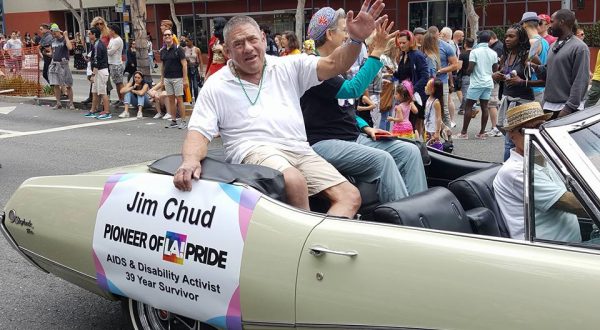
In November of 1977, while in my sophomore year of college, I came down with what appeared to be some sort of infection. I was on the tennis team and, not wanting the whole squad to come down with anything, Yale admitted me to the student hospital and gave me every test they could think of to diagnose my “flu” as I had night sweats, a rash, mump-like swollen lymph nodes and thrush. My immune system counts were on the low side, and I developed a list of things I knew I didn’t have.
In a little less than two weeks time, my symptoms subsided, and I was discharged with a clean bill of health. My doctor walked me out of the building saying “well, you’re fine now, you probably had some sort of virus.” Of course, today, if someone walked into a doctor’s office with that set of symptoms, he would be given an oral HIV test and told about what happens to the human body when one “sero-converts” and develops antibodies to HIV. Times have changed.
On this World AIDS Day, Dec. 1, I will enter my 40th year of living with HIV. I have seen a lot over those years, and in the melee of the early- and mid-Eighties, saw too many men I knew get sick and seemingly die suddenly, usually after having most of their lean muscle mass boiled off their frames by the disease.
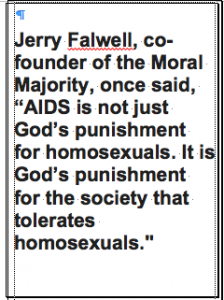 I still have those PTSD moments of being in my friend Jerry’s hospital room and seeing him in a fogged-up oxygen tent, his struggle to take every breath made painful and difficult by pneumocystis pneumonia. He motioned me to come into the tent so that we could hear each other, and scared, I looked around the room for reassurance that I wasn’t going to hurt him if I did so. A nod from his lover, and I was in the steam, touching his sticky “old person” hand and bawling my eyes out.
I still have those PTSD moments of being in my friend Jerry’s hospital room and seeing him in a fogged-up oxygen tent, his struggle to take every breath made painful and difficult by pneumocystis pneumonia. He motioned me to come into the tent so that we could hear each other, and scared, I looked around the room for reassurance that I wasn’t going to hurt him if I did so. A nod from his lover, and I was in the steam, touching his sticky “old person” hand and bawling my eyes out.
It was the first time I ever touched someone who I knew was going to die since my dad had died of lung cancer in my late teens. It would not be the last time that happened, not by a long shot. We hugged and had a good cry, and Jerry, being several years my senior, tried to comfort me. Can you imagine that he was worried about how seeing him in this condition would affect me? His humanity in that moment was something I will never forget. His last words to me were “don’t let it do this to you.”
That was the day that AIDS got real for me. We have learned a lot about the disease since then. For instance, at a recent three-day conference of the AIDS epidemic’s medical luminaries from both France and America, hosted by Dr. Robert Gallo, one of the esteemed medical researchers in attendance presented the results of his efforts to back-trace the epidemic in the U.S. They indicated that in 1981, when Dr. Michael Gottlieb presented those first five cases of Pneumocystis to the Centers for Disease Control, there were already 250,000 people infected with the virus. In the beginning, what was mistakenly thought to be a more virulent, fast-acting virus was actually the disease proceeding along its course without any intervention. The conference is covered in a recent article in Science Magazine by Jon Cohen, a long-term HIV journalist, and it is quite enlightening and moving.
The AIDS Epidemic Is Not Over
One of the most important points supported by all in attendance was that the AIDS epidemic could not possibly be over with 37 million people still living with HIV, of whom only 17 million are receiving treatment. Last year alone, 2.1 million more people were infected, yet I have heard on two of the three major network national news shows phrases beginning with “now that the AIDS epidemic is over…” The point of this conference was to make sure that the history of the epidemic is not lost so that we doesn’t make the same mistakes that were made in the 80’s.
My best ideas back in 1985 of how to keep from wasting away and dying were to take my working out to an absurd but life-sparing level and put on as much muscle as I possibly could. I started working out like a fiend and taking every steroid I could get my hands on. I was way ahead of the curve when it came to bodybuilding in the gay community, and I took a lot of flak from my straight friends and many others for looking so “freakish.” Let’s be honest here, there were perks for being a big muscle-guy in many gay circles, so the notoriety had its advantages too.
I also used the gym and the drugs – yes, steroids are drugs with mood altering qualities – to escape the fear and feelings I was having as more and more of the people around me getting sick and dying.
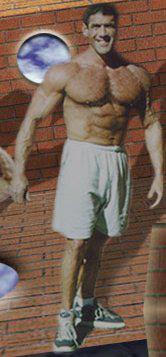
In 1987 I was living in DC, and after two senseless double-blind studies at George Washington University, I drove out to the National Institutes for Health (NIH) with my best friend and volunteered for whatever clinical trial would take me. I was 29 and not expecting to see 35 since that seemed to be when all my friends were getting sick and passing away. I figured that if I somehow hit the jackpot and the drug in my study was the answer or an answer to AIDS, then “fantastic.” If not, and the drug was useless, which was the more likely result, then at least I had done something concrete to help eliminate one of the clunkers.
So many of us, both HIV positive and negative were desperate to do something to help, and this worked for me. Unfortunately, the study I was in, which combined high doses of AZT and DDC, a new drug being put in studies by Roche Pharmaceuticals, revealed that DDC, while effective in the test tube against HIV, was very toxic and put all 80 of us through a gang of side effects that were unfathomable to me.
The first was a full body rash that on some was so bright red and painful that they had to be hospitalized until their skin “sluffed off” as in Stevens – Johnson syndrome. That one bypassed me. The mouth sores that followed were legendary, and we all enjoyed them. Eating required gargling with “Lidobenelox,” a thick pink emulsion of lidocaine, Benedryl and Maalox that looked like the hand soap in most public restrooms. Some, the unfortunates whose sores reached down their esophagus, would have to swallow the stuff, and after that they rarely felt like eating. For me it was just a swish and spit for 20 minutes of pain relief.
About five weeks into the study, I began to see our formerly full waiting room for the study becoming less and less full, and I began to fear that the study would stop. I was rooting for this one to be a success for so many reasons that weren’t about me. I have to admit that I felt invincible, like I was going to live forever. After all, I was the big healthy muscle guy in the study. This study was for all of those other sick guys, right? Denial served me well. I then experienced the “side effect” that would change my life forever.
I had taken a good friend who was in a different study at the NIH out for what ended up being his last restaurant meal. When we arrived in the restaurant, all eyes were on us. It hadn’t dawned on either of us that we might look a little scary — everybody we knew had various lines and bandages hanging off them — and the host placed us in a very private corner of the dining room. We both had a good laugh on that one. About 10 minutes after our food came, I started dropping my utensils for no apparent reason. In a surprisingly short time I could not open my mouth wide enough to put food in, and I couldn’t do anything but slurp it off my plate. Something was very wrong. I paid the check and we bee-lined it to the NIH.
Joe’s driving was a revelation as he was seeing a blurry triple image at best and back then the section of Georgetown Pike that we used to access the NIH had no lighting. I think I am going to credit our success at making it to the NIH alive to providence. Unlike today’s post 9/11 double fence, armed security gates and brighter-than-daylight lighting, the NIH campus was dark and wide open. We drove up to the front doors of building 10, the research center and hospital, and Joe stumbled in to find someone to help me. By a stroke of incredible luck, or yet more providence, one of the “fellows” from our study was the on-call physician that night. Each study was assigned research fellows who were doctors in their residency at the Naval Hospital, which was across the street from NIH, and the fellows were the study participants’ direct medical connection to the study.
An Element of Comedy and a Risk of Death
Rick Rosenberg, the on-call that night, greeted me with “Oh, hello Mr. Chud, you know, we are not an emergency room, what seems to be the problem?” I tried to tell him through my clenched teeth as Joe, having had a brain biopsy earlier that day, had been unable to speak clearly enough for Rick to understand him. There was an element of comedy to this whole evening that was a gift in my eyes. In a flash, I was on a gurney, and Rick was on the phone with Sam Broder, the head of AIDS Research at the National Cancer Institute of the NIH. His marching orders were to draw some fluid off my knees, which were more swollen than any of my other joints, and admit me to the ward on the 12th floor.
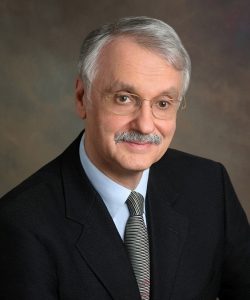
After about 30 minutes of repeated failed attempts to drain anything off my knee, I could see that Rick was crying, and I asked him to stop. I will never forget the look of his bloodshot eyes as he dried off his glasses and apologized over and over for having failed and causing me so much pain. Rick’s care was emblematic of how much we all felt that NIH was on our side. I tried to comfort him, and we agreed to throw in the towel. He was under a lot of pressure to perform, which I totally understood, and in the end, it wasn’t that crucial.
The next morning Dr. Broder came into my room with all of the study fellows in tow. After walking around my bed a couple of times and going “hmm’ a few times, he said “Ya know Jim, if you can just get past this side effect, the virus just hates this drug.” Through my clenched jaw I replied: “Uh, Sam, this isn’t the quality of life we discussed at the beginning of the study.” With a forlorn look, he sighed saying “I guess you’re right” and took me off the study, telling my research fellow, Stan Liebowitz, to make me comfortable. Stan crushed three pills in a cup of water and put a straw in my mouth while asking me if I had ever had a Percodan, When I shook my head “no” he said “You’re really going to like this.” And we both laughed.
Ironically, my second day in the hospital was the same day that ACT-UP was outside Building Ten, putting a chain and padlock on the doors and accusing the researchers of being corrupt slackers, and hiding all of the “good drugs” from the public, and many other things that I knew were not true.
As I was watching the scene on TV, a nurse came in my room and said something like “can you believe what is going on outside? It’s frightening.”
Of course, being emboldened by both my pain meds and steroids, I demanded to be wheeled down there so that I could tell them how wrong they were. She looked at me and laughed saying, “yeah, okay Superman, get real now, cause honey, you ain’t going nowhere as long as I am your nurse. If you want to go teach them a lesson, then I suggest you put your clothes on and march yourself down there, cause I ain’t gonna take you.” Seeing the absurdity of the whole situation, I gave in.
My symptoms resolved in three or four days. I was told at the time that my immune system had mounted a response to my cartilage, and that my condition was a lot like rheumatoid arthritis. What no one realized at the time was how much damage to my cartilage had occurred or that the process would continue for the rest of my life at a subclinical level until all hell broke loose. I know that upon my return to the gym and mountain biking, my joints never felt quite right.
What really surprised me is that at the time I was taken off the study they didn’t plan on monitoring me going forward. I asked about it and was told that there was no funding for and nothing in the protocol about following people after the participation phase was done. At the time, I remember being really shocked about that, especially in light of the trajectory that this epidemic was taking and the concern with finding the key to long term survival by AMFAR and others.
Being Homosexuals Made Us Much More ‘Disposable’
It became alarmingly clear that we were considered “disposable” since we would probably die in a few years from AIDS, so no questions would be asked about why we died. The other sad fact was that being “homosexuals” made us that much more disposable. I was reminded about Legionnaire’s disease, which, after 12 people got ill at a convention, elicited a large all-hands-on-deck response from the federal government. It was a problem whose scale and lethality were miniscule in comparison, yet the government’s response was immediate and comprehensive. Remember, this was in the day of the “Patient Zero” witch hunt when so many Americans wanted to find some “homosexual” to blame for bringing this epidemic into our country. In the end, that frenzy and waste of time only served to energize the gay rights community and at least we knew who our enemies were.
In 2003, pain in my lower back and most of my supportive joints reached a point that drove me to the local orthopedic surgeon, and my first MRI in 14 years showed so much damage to my spine that the radiologist didn’t believe they were my films.
The 12 years since then have treated me to over 80 operations on my spine, neck and major joints to try to ameliorate the legacy of that clinical trial. The reality is that I am now seven inches shorter than when I entered the study, since all my disks are gone. There are more than a few people who, upon seeing me for the first time since my body building days, have no idea who I am until they hear my voice.
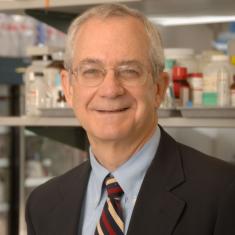
In 2009, I had heard from my local HIV doc that the head of the study in 1987 was still at the NIH, and that he had taken over the spot formerly held by Dr. Broder. So I decided to call him and ask if NIH would check me out and see if they had any ideas for how to deal with my condition. This was at the time that I first began to depend on a four-wheeled walker. Trust and believe that I had no idea of what “being disabled” or living with a disability really meant prior to that first day. It still surprises me how long even the simplest tasks take, especially since my athleticism formerly made getting around something I never even thought about. My drive to do something for other disabled people shifted into hyper-drive from that moment forward, and I am working hard today to make a difference in the lives of other disabled seniors.
When Dr. Yarchoan, the aforementioned investigator and current director of AIDS Research in the NCI answered the phone, I said “Hello Dr. Yarchoan, this is Jim Chud.” After what seemed like a very long time he barked “Is this some sort of joke?”
“No,” I said. “What do you mean? Do you remember me? Jim Chud, you know the big guy with the joint problems.”
Then came the realization –
“No way, really, oh my God – it can’t be…” And he yelled down the hall “Hey Kathy, you are not going to believe this, but Jim Chud is on the phone!” I heard a woman’s voice in the background, and he got back on the phone to ask “Mr. Chud, how are you doing?” I told him that my condition was what I was calling about, and he stopped me to explain his surprise at hearing my voice. “Mr. Chud, do you know how many people there are that can tell the tale of what high dose DDC can do and did to them?” I said no.
“You, period.”
I Suddenly Knew How Loneliness Really Feels
A chill ripped up my spine, and I suddenly knew how loneliness really feels. I asked him if he was sure and he assured me that he was. I made arrangements to go back there for a work-up and was reminded of just how humane the researchers at the NIH really are. He was concerned, happy and eager to see me, and offered me any resources that the NIH might have to help me. I was quite overwhelmed by the whole occasion, especially since I knew that the funds for my visit were coming out of his admin dollars, not for any study or drug company.
Since that day, I have thought a lot about the other people in that study and other studies that, like any U.S. soldier, had volunteered for the task of saving lives and helping protect our nation from the ravages of the war against AIDS. I have spoken to a couple of other people who I know were also in studies that went south a little later in the epidemic. Both of them had their lives completely destroyed by what happened to them. Both of them have since died.
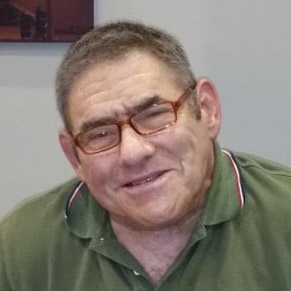
After an exhaustive search of my own, I have found no one else who is still around to talk about his study and consequences he has suffered. I know they are out there, and maybe this article will tease some out of them out, but you never know. In the early days, everyone was desperate to find a solution to HIV infection, and many harmful drugs did make it to market before things like kidney stones and peripheral neuropathy cropped up. Thankfully most of these symptoms can be treated. The reckless abandon practiced by the large pharmaceutical companies and a lack of willingness to take responsibility is what angers me now. I can only hope that when the next big disease hits, and in places like cancer research, a more humane, responsible approach is taken.
I am a very lucky man in so many ways and have been able to make a good life for myself. Sure, there have been some really tough times and losses, mostly because I turned to cocaine to blot out the physical and mental pain that I had not dealt with in a constructive way. My cocaine addiction has really taught me a lot about empathy too. Let me tell you, the big drug companies that made and continue to make billions of dollars from the drugs that passed muster and minimized their losses because of the men and women who like myself volunteered and received the drugs that failed, those companies have never once reached out to any of us to offer a simple “thank you” or to see how we were doing after our trial experiences. In my opinion, this is reprehensible. Now, when early long-term survivors really need help, there aren’t any “Wounded Warrior” associations reaching out to us.
Unending Pain, Fatigue, Malaise, Neuropathy, Lost Jobs, Lost Houses, Lost Lovers and Lost Families
I remember the pit of depression that many people I had met at the NIH fell into because of unending pain, fatigue, malaise, neuropathy, lost jobs, lost houses, lost lovers and lost families. Back in the days when AIDS was the darling of the fundraising set, some people got help. As I have seen the amazing groundswell of support for our veterans returning from Iraq and Afghanistan, which I feel is more than deserved, I do have hope for more humane treatment moving forward.
I have to admit though that I get more than a little sad when I see how the AIDS Warriors – the Forgotten Warriors, have been treated. Like I said, I have had the resources to make a life for myself, but the vast majority of people, at least in my study cohort, were already further along in their disease and were left to fade away. That is just wrong!
For a long time I had overwhelming survivor guilt because I could not see the purpose in keeping me around after so many good men and women had perished. That changed one night in the recovery room at Cedars-Sinai Medical Center after one of my earliest procedures. As the anesthesia began to wear off, I sat up in my gurney/bed and could not inhale. I looked all around the sea of beds, and no one was there to help me. As I started to panic, understanding that my lungs had collapsed, I was flailing around and beating on the rail of my bed and I paused to make that “Hail Mary” prayer to God.
It went like this “God if you will just let me take my next breath and live, I will spend the rest of my life helping others with this disease and other disabilities to the best of my ability.” As soon as that last word passed in front of my mind’s eye, my lungs opened up, and I took in another breath. The honor, the hope and the humility of that moment changed and continue to change my life.
My wishes for this World AIDS Day are that:
— The world realizes that this epidemic is far from over.
— It is important to volunteer for studies and other opportunities to help.
— That other people like myself speak out and tell their stories if they can.
— That somebody listens and cares.
— That younger people learn about the worst of the epidemic and are taught not to make our mistakes.
— That we all try to understand each other a little better.

Jim, you are an inspiration and the very definition of a good citizen. You have dedicated your life to helping others and advocating for needed attention to address the overwhelming impact of the AIDS epidemic on our community. Thank you for your work and for reminding us where we came from and why we continue on in this fight.
While I wish I had the time/energy to sit down with each and every one of you kind people and answer any questions you might have while thanking you for the wonderful thoughts that you shared. A short version appeared on Qweerty.com and of course there is always someone who hates what I said – this particular one just makes me chuckle every time I think of it. His comment read ‘What does this guy want, a medal?’ Well, no. This comment did manage to touch on how I feared this piece would come across. I only hope that everyone… Read more »
Wawoo! Praise be to God for Chud’s life, and Jim Chud thanks a lot for that Candid AIDS fight for over 33years! For me i got more touched about what your friend Jerry’s comment about ” AIDS not being just God Punishment to Homosexuals but to the Homosexual Tolerant Society!” and your prayer to God that sprang you back to life! we have to Seek the Almighty Gods intervention through praying without ceasing, otherwise relaying on human mighty will fail whatever attempt!, claiming more human lives, denaturing many more, like your are suffering at the hands of multinational Drug companies… Read more »
I remember Jerry Falwell saying on his birthday that he knew the Lord had planned decades of work ahead for him to do. Then two weeks later his “Sky God” pulled the plug on the fat bilble
beater.
It was an honor to serve with Jim on the Disability Board and no matter what the odds, or what he was up against he continued to work on things bigger than himself. Jim’s done so much for so many with so much dignity that its a privilege to know him and call him a friend.
GREAT story Jim. Thank you for speaking up. It’s hard to believe that so many don’t think of HIV/AIDS as anything other than it is today and you are right on. This epidemic isn’t over. Your spirit of resistance is more important today than ever.
Well said and done. Thank you, Jim. For everything. Your survival amazes and gives me hope after my own 33-year “journey”. Your example of courage and perseverance humbles me and gives me courage.
Thank you for sharing your story Jim I am personally grateful that you survived and are around to tell the story. Stick around a lot longer. You are needed.
Thank you for such an honest and inspiring story.